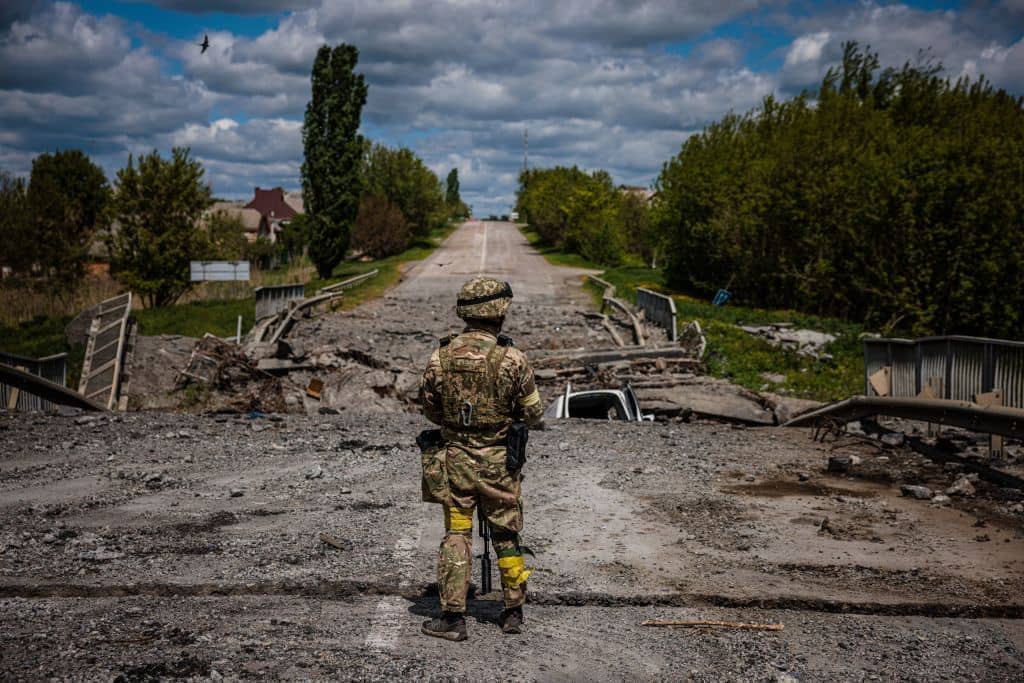If the reports are right and it was Ukrainian special forces who destroyed as many as 20 Russian aircraft at Saki air base in Novofedorivka, Crimea, on Tuesday, president Volodymyr Zelensky might be minded once more to raise a glass to the British. Earlier this year it was widely reported that British special forces were in Ukraine training local troops – but perhaps they also found time to pass on some of the regiment’s illustrious history.
It was the Special Air Service (SAS) who pioneered the tactic in North Africa, destroying over 200 Italian and German aircraft in a series of devastating raids 80 years ago.
The SAS had been formed in the summer of 1941 as a parachute force, but its inaugural raid in November that year was a costly failure with 34 of the 55 men who jumped into Libya killed or captured.
For their next operation, in December, it was decided to approach their target airfield in the trucks of the Long Range Desert Group (LRDG), a brilliant desert reconnaissance force.
The six SAS raiders were dropped three miles from Tamet airfield and they walked the rest of the way, led by Lt Paddy Mayne, a rugby international before the war and a born guerrilla fighter.
By June the SAS had destroyed 143 aircraft – more than the number shot down by the Royal Air Force
There were no guards on the airfield and not even any wire. It was an indication of how safe the Italians felt so far inside their own lines. The first destination for the SAS was the airmen’s mess. Mayne kicked open its door. The Italians were relaxing, playing cards or writing letters home. For a moment the Irishman and the puzzled Italians looked at each other without a word being said. ‘Good evening,’ said Mayne, and then he and his men opened fire.
Having killed the aircrew, the SAS moved among the aircraft, planting bombs on the wings close to the fuselage. The bombs were rudimentary but effective: contained in a small linen bag, they were composed of plastic explosive and thermite, rolled in motor car oil, and fitted with a detonator, instantaneous fuse and a time pencil. That night the SAS destroyed 24 aircraft.
A fortnight later Mayne returned to the same airfield and this time he and his men blew up 27 aircraft.
The psychological effect of the raids was as significant as the material damage caused to an Axis air force already short of spare parts because of Allied air attacks on their supply ships crossing the Mediterranean. Aircrews who had hitherto been able to unwind after operational flights were now on a continual state of alert. Frayed nerves had no chance to heal.
The SAS continued their raids in the spring of 1942 and by June they had destroyed 143 aircraft – more than the number shot down by the Royal Air Force.
The Luftwaffe issued a memorandum in the wake of the June raids entitled ‘Proposals for the Improvement of Defence Measures against Enemy Commando’. The Germans believed that the British guerrillas ‘consist chiefly of personnel especially suitable by reason of their profession – acrobats, boxers, etc. – specially equipped and with an extensive and thorough special training’.
To counter the saboteurs, the Luftwaffe encircled airfields with barbed wire, placed sentries under planes and equipped some of them with guard dogs.
The SAS responded by changing tactics. Instead of penetrating airfields on foot, they drove onto them in the new American jeeps that had recently started arriving in North Africa. The SAS fitted the jeeps with heavy machine guns that could fire 1,200 rounds per minute.
In one raid on Sidi Haneish airfield – 30 miles inland from the Egyptian coastal town of Mersa Matruh – the SAS destroyed or damaged 30 aircraft in this fashion.
In a letter to his wife on February 2, 1943, General Erwin Rommel, commander of the Afrika Korps, described the SAS as the ‘desert group which has caused us more damage than any other British unit of equal strength’.
Independent military analysts estimate that the raid on Saki air base could have cost Russia £500 million in destroyed aircraft. The Russian air force deny that a raid took place and claim that any damage caused was due to a ‘violation of fire safety requirements’ near a munitions dump.
There has been no official confirmation from Ukraine that its special forces were responsible for the raid, only a sardonic message from the Ministry of Defence advising Russian civilians that Crimea might not be an ideal holiday destination this summer.
Gavin Mortimer is the author of ‘David Stirling: the life, times and truth about the founder of the SAS’ (Constable 2022).







Comments